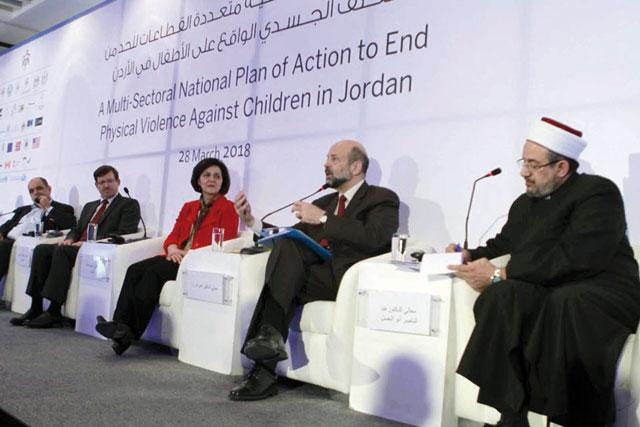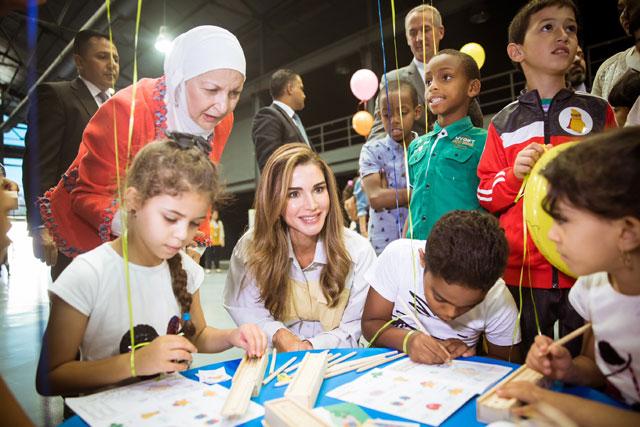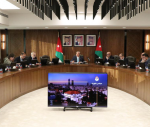You are here
Gov’t ready with plan to curb violence against children
By Rana Husseini - Mar 29,2018 - Last updated at Mar 29,2018

Stakeholders meet to launch a national strategy and action plan to curb violence against children in Amman on Wednesday (Photo courtesy of National Council for Family Affairs )
AMMAN — The government on Wednesday pledged to implement a three-year national strategy and action plan to reduce physical violence against children in Jordan.
The pledges were made during the launch of the Multi-Sectoral National Plan of Action to End Physical Violence in Jordan that was organised by the National Council for Family Affairs (NCFA) and UNICEF.
The national plan, developed jointly by government line ministries, institutions, the private sector, civil society organisations, media and the UN, aims at significantly reducing physical violence against children in all settings in Jordan by transforming social norms and practices.
Several relevant ministers attended the launch event to discuss the problem of violence against children in Jordan and at the same time pledge to implement the three-year blueprints.
Minister of Education Omar Razzaz told the gathering that violence at schools is “a reality and is one of the challenges we face in public and private schools”.
“The ministry works in cooperation with the concerned partners to implement a comprehensive plan of action that includes structural, preventive and treatment programs to protect students from violence and reduce it to a minimum,” the minister said.
Minister of Social Development Hala Lattouf added that the elimination of violence against children in all its forms is a priority that requires the concerted efforts of all concerned institutions using a scientific method in the diagnosis, assessment and intervention regarding violence against children.
Minister of Health Mahmoud Sheyyab pointed out that violent forms of discipline can lead to physical pain, injury and even mutilation, and have serious and long-term consequences on children's lives.
“Wounds and bruises may disappear, but mental and psychological scars will not. Corporal punishment hampers the child's growth, learning abilities and academic performance, and leads to a decline in self-esteem in the child, psychological stress and depression, and sometimes leads to risk of self-harm and hostile behaviour,” Sheyyab said.
In addition, Sheyyab continued, violence entails significant economic costs for Jordanian society.
Minister of Awqaf and Islamic Affairs Abdul Nasser Abul Bassal said Islam does not tolerate violence against children, adding that “Sharia is clear about perpetrators: they will be punished”.
Abul Bassal added that scholars, imams and men and women preachers have an important role to play in communicating that to all segments of the society.
“The Ministry of Awqaf and Islamic Affairs is planning activities that seek to develop and deepen a common understanding among members of society aimed at condemning physical violence against children and spreading messages based on religious texts and societal values on parental care and effective educational practices promoted by Islam,” Abul Bassal stressed.
Meanwhile, Director of the Public Security Department (PSD) Maj. Gen. Fadel Hmoud, stressed that the PSD is committed to introducing new mechanisms to reduce physical violence against children.
The Family Protection Department strives towards expanding its geographical reach across all governorates, through improved services and opening of additional family protection units to guarantee that children and families continue receiving the best protection services, Hmoud added.
Acting Secretary General at the NCFA Mohammad Miqdadi also addressed the gathering, saying that the council works to promote a set of principles to provide protection for children.
“These principles include strengthening partnership and coordination among all concerned institutions, and follow-up to ensure provision of high quality child protection services,” Miqdadi said.
Speaking as a private sector representative, Zain Jordan’s Chief Executive Officer Ahmad Hanandeh said that being part of the local community, “Zain strongly believes in the significance of creating awareness among the society to contribute in eliminating violence in its various types and substituting these unacceptable acts with positivity, care and compassion needed to create a brighter future for our leaders of tomorrow”.
UNICEF Jordan representative Robert Jenkins told the gathering that the inter-sectoral strategy and action plan is a tremendous achievement by the government of Jordan, civil society, media and the private sector.
“UNICEF is committed to striving with you and providing all support possible in ending violence against children — which will also contribute greatly towards Jordan achieving its Vision 2025 and the Sustainable development Goals,” Jenkins stressed.
Jordan made significant progress in addressing violence against children, especially in schools and classrooms, said chief of Child Protection at UNICEF Maha Homsi.
But violence against children continues to persist at homes and other settings, according to Homsi.
“Whether at home, work or school, and in any form, whether the violence is physical, psychological or sexual, and by anyone, whether a guardian, caregiver, teacher or peer – combating violence against children requires a comprehensive and multifaceted response to address underlying causes,” Homsi told The Jordan Times.
Homsi pointed to alarming figures by the Department of Statistics Family Health Study for 2012 which indicated that “nine out of ten children were subjected to violent discipline practices at home”.
“We believe that the numbers will not change. This is a very high rate,” Homsi added.
Homsi said the plan from the meeting today and the subsequent application of the three-year plan is to hopefully reduce by 50 per cent the physical violence from parents against children, physical violence from teachers against children and bullying between children”.
“This is an ambitious plan and we hope we will be able to achieve it when all these ministries commit to the plan and give us priority to implement it,” Homsi explained.
The national plan will be implemented in a collaborative manner, drawing upon strengths and resources of all potential partners, according to a press release by UNICEF.
As part of the Strategy, UNICEF and NCFA have also assisted partners in developing integrated action plans and providing them with resources and platforms to jointly contribute towards ending violence against children in Jordan, the press release stated.
Related Articles
AMMAN — Her Majesty Queen Rania attended the launch of a festival organised by the National Council for Family Affairs (NCFA) and UNICEF on
AMMAN — Although there are positive signs related to the reduction of violence in the Kingdom’s schools after implementing a nationwide camp
AMMAN — Two weeks into a nationwide social media campaign titled “Allem La Tallem” on violence against children that has received over 2 mil
















